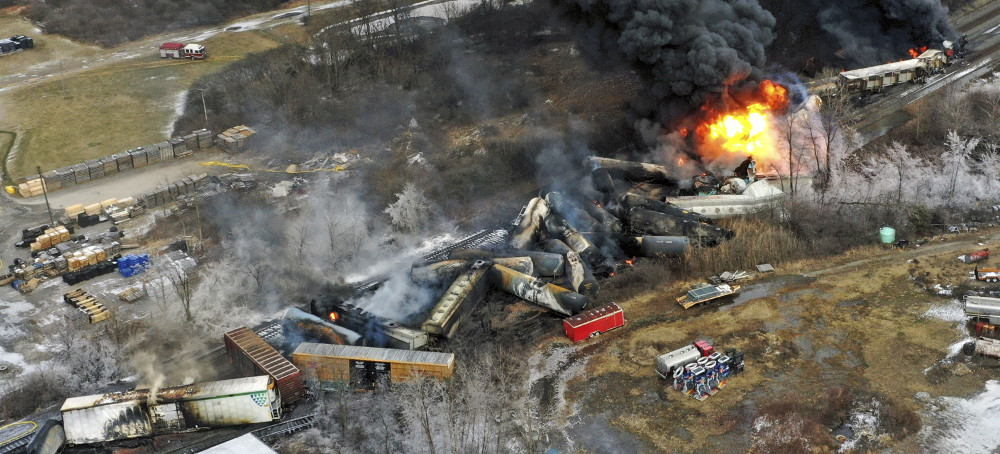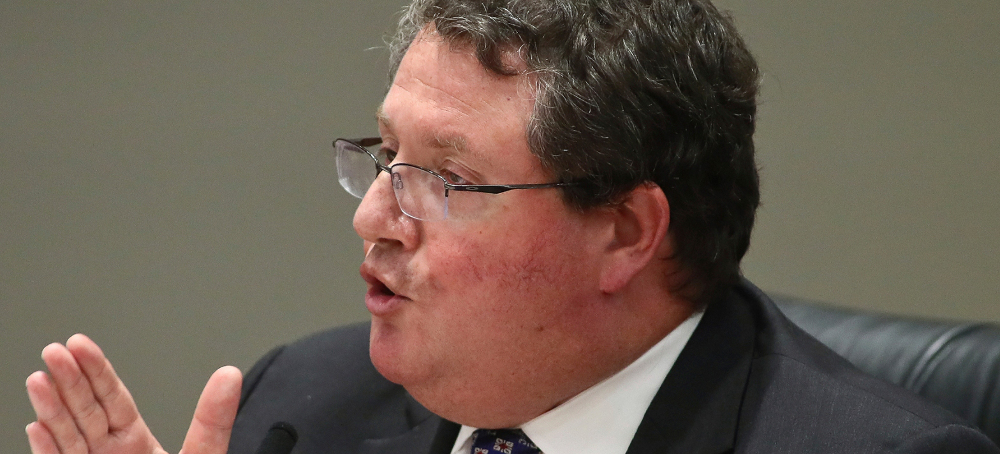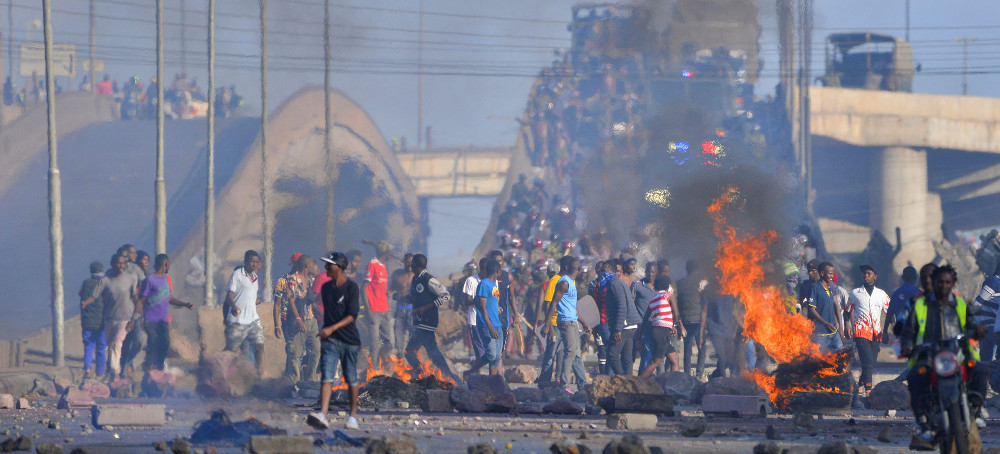Live on the homepage now!
Reader Supported News
Bernie Sanders’s grilling of Starbucks’s union-busting billionaire Howard Schultz put a CEO in the hot seat on a national stage. It also forced Senate Democrats who might rather stay on the Democratic donor's good side to denounce his flagrantly illegal behavior.
Workers at Starbucks have been unionizing, voting yes to form unions at nearly three hundred stores and filing for elections at even more. Sanders, after two formidable presidential campaigns, is one of the most popular politicians in America and is still viewed nervously by the Washington establishment. With Sanders at the head of the hearing and Starbucks workers in the audience, Senate Democrats rightly treated Schultz, a longtime Democratic donor who ran for president in the 2020 primary, like the criminal that he is.
Sanders has been convening hearings about capitalist wrongdoing, presiding with his trademark vibe of focused and righteous exasperation, looking as pissed off as he’s given all of us permission to be. (His new book is titled It’s OK to Be Angry About Capitalism.) Schultz at first refused to appear, but threatened with a subpoena, he had no choice. The main subject of the hearing was Starbucks’s extensive illegal efforts to prevent its employees from joining a union. Workers have filed more than two hundred unfair labor practices complaints against the company. Starbucks management has punished workers for union organizing, including by firing those workers and depriving them of benefits.
Schultz and the Republicans kept insisting these were just “allegations” and under “investigation.” Schultz repeatedly insisted that Starbucks “did not break the law.” These were lies.
National Labor Relations Board judges have in numerous cases found Starbucks guilty of violating workers’ right to organize and have even ordered the company to admit this to employees and reinstate fired workers. One administrative judge reprimanded the company for “egregious and widespread misconduct demonstrating a general disregard for the employees.”
Schultz’s denials of illegal union busting, Senator Chris Murphy, a Connecticut Democrat, told the former CEO, were “akin to someone who has been ticketed for speeding a hundred times saying, ‘I’ve never violated the law, because every single time — every single time — the cop got it wrong.’ That would not be a believable contention.”
It was important that the excoriations of Starbucks came from Murphy and indeed, all the Democrats present, not only from Sanders. All Democrats present expressed support for the workers and harsh condemnation for Starbucks. None of them went easy on Schultz — not even Senator Patty Murray, who represents Washington State, where the company is headquartered and who has received campaign contributions from Schultz. She questioned Schultz about complaints from workers, saying that she was “troubled” and “disappointed” to hear about the company’s widespread union-busting efforts.
Schultz seemed personally offended that Democrats whose goodwill he thought he’d purchased were throwing him under the bus, especially Murray. He reminded Senator Murray, in a wounded tone, that they’d known each other for years and that she used to speak of Starbucks as a model company.
Republicans seemed amused to find themselves defending a known Democrat like Schultz but made clear that their commitment to capital and their class solidarity with bosses eclipsed any other values they might espouse. Mitt Romney joked about the oddity of finding himself, as a Republican and a Mormon who eschews coffee for religious reasons, on Schultz’s side, but quickly pivoted into a full-throated defense of the ownership class.
“It’s somewhat rich that you’re being grilled by people who have never had the opportunity to create a single job,” Romney said to Schultz. “And yet they believe that they know better how to do so.”
Like most anti-union ideologists, the Senate Republicans effused over the importance of supporting unions in other far-flung situations, unions in the past (back in the dark days when workers were exploited) or those supporting the Keystone Pipeline (of course), but repeatedly insisted that Starbucks didn’t need a union.
It was nearly impossible for Starbucks’s defenders to make the case that the company had followed the law and respected the workers’ rights, so they did their best to change the subject to the greatness of capitalism, the dangers of socialism, Sanders’s hypocrisy in denouncing the rich despite his success as a best-selling author, and of course, the abuse this country heaps upon the poor capitalist. Rand Paul opined:
Ayn Rand’s Howard Roark points out the ingratitude that man has for the entrepreneur, the creator. Thousands of years ago the first man discovered how to make fire — he was probably burnt at the stake he taught the others to light. . . . Many would argue we have too much food. It’s extraordinary how wealthy we are!
Sanders kept his cool. “This isn’t about my book, or Venezuela,” he deadpanned at one point.
We often hear laments about “partisan division” in this country, but too often, Republicans and Democrats are united in the fight that matters most: supporting capitalists against workers. Schultz’s bad day at the Capitol showed that worker power can change that, forcing parts of the governing class to turn against the bosses and make concessions to the workers. We’re seeing a similar dynamic in Albany, New York, this week, as legislators support some socialist and working-class demands, including protections for tenants, indexing the minimum wage to inflation, and taxing the rich.
Democrats gave Schultz, who remains on the board of Starbucks even though he recently retired from being CEO, an assignment: bargain in good faith and sign a first contract with at least one of the unionized stores within two weeks. It will doubtless take more organizing to resist Schultz’s backdoor efforts to wheedle the Senate Democrats back into the fold, but yesterday was a good start.
READ MORE  Rep. Marjorie Taylor Greene, R-GA, and others tweeted outrage at Trump's indictment. (photo: Jabin Botsford/The Washington Post)
Rep. Marjorie Taylor Greene, R-GA, and others tweeted outrage at Trump's indictment. (photo: Jabin Botsford/The Washington Post)
Speaker Kevin McCarthy, Reps. Jim Jordan and Marjorie Taylor Greene and others have pushed back against the former president's indictment, calling it a political "witch hunt."
“Outrageous,” tweeted Rep. Jim Jordan, R-Ohio, who is using his roles as chairman of the Judiciary and Weaponization of the Federal Government committees to investigate Bragg’s work.
House Speaker Kevin McCarthy, R-Calif., whom Trump endorsed in his bid for speaker, wrote that Bragg “has irreparably damaged our country in an attempt to interfere in our Presidential election” and “weaponized our sacred system of justice against President Donald Trump.”
McCarthy hinted that GOP-controlled House committees could soon subpoena Bragg to compel his testimony before Congress: “The American people will not tolerate this injustice, and the House of Representatives will hold Alvin Bragg and his unprecedented abuse of power to account.”
Jordan, as well as House Oversight Committee Chairman James Comer, R-Ky., and Administration Committee Chairman Bryan Steil, R-Wis., sent a letter this month asking Bragg to testify before Congress about his investigation into hush money payments Trump made to adult film star Stormy Daniels.
Rep. Ronny Jackson, R-Texas, Trump’s former White House physician, tweeted: “Alvin Bragg is a NATIONAL EMBARRASSMENT to our justice system. President Trump has been proven to have done NO wrong. This is nothing more than a political stunt to prevent Trump from becoming President in 2024! WITCH HUNT!”
Rep. Marjorie Taylor Greene, R-Ga., who was preparing to deliver a Lincoln Day address in Gettysburg, Pennsylvania, on Thursday night, tweeted, "The irony of standing on the battleground when I found out President Trump has been indicted is profound."
Greene said Trump was innocent and “the only one standing in the way of these modern day tyrants, just like our founding fathers did, to protect each of us from evil.”
“Impeach Biden,” she continued. “He’s given us every reason and the family banking records and more are giving us receipts. But now that the gloves are off. Prosecute any and all crimes. Enough of this witch hunt bullshit.”
On the other side of the Capitol, a onetime Trump presidential rival, Sen. Ted Cruz, R-Texas, tweeted: “The Democrat Party’s hatred for Donald Trump knows no bounds."
“The ‘substance’ of this political persecution is utter garbage,” said Cruz, a former Texas solicitor general. “This is completely unprecedented and is a catastrophic escalation in the weaponization of the justice system.”
Sen. Josh Hawley, R-Mo., warned that Democrats "will regret this."
“Tonight’s indictment of Donald Trump isn’t about the law. It’s about power. Raw power. ... It is an assault on our democracy, pure and simple," Hawley tweeted.
Ohio Sen. JD Vance, one of the five GOP senators who has already endorsed Trump in the 2024 presidential primary, said in a statement the indictment represents a “political persecution masquerading as law.”
“Alvin Bragg’s decision to indict him is blatant election interference and a direct assault on the tens of millions of Americans who support him," said Vance, whose victory in a competitive Senate primary last year is largely credited to Trump’s endorsement.
“Instead of working to improve the lives of the Americans they are supposed to represent, the ruling party is focused on kneecapping their greatest threat in the next election,” Vance added. “The American people will see this for exactly what it is: a grave miscarriage of justice.”
READ MORE  UN secretary-general Antonio Guterres talks with Russia's ambassador to the UN Vassily Nebenzia. (photo: Justin Lane/EPA)
UN secretary-general Antonio Guterres talks with Russia's ambassador to the UN Vassily Nebenzia. (photo: Justin Lane/EPA)
Monthly rotation of presidency of 15-member council has been unaffected by Ukraine war
From Saturday, it will be Russia’s turn to take up the monthly presidency of the 15-member council, in line with a rotation that has been unaffected by the Ukraine war.
The last time Russia held the gavel was in February last year, when Putin declared his “special military operation” in the middle of a council session on Ukraine. Fourteen months on, tens of thousands of people have been killed, many of them civilians, cities have been ruined and Putin has been indicted by the international criminal court for the mass abduction of Ukrainian children.
In such circumstances, putting Russia in the driving seat of a world body tasked with “maintaining international peace and security” seems like a cruel April fools joke to many, not least the Ukrainian mission to the UN.
“As of 1 April, they’re taking the level of absurdity to a new level,” said Sergiy Kyslytsya, the Ukrainian permanent representative. “The security council as it is designed is immobilised and incapable to address the issues of their primary responsibility, that is prevention of conflicts and then dealing with conflicts.”
The ambassador said Ukraine would stay away from the security council in April except in the case of an “issue of critical national security interest”. Ukraine is not a current council member, though it is often called to speak on issues related to the war.
The US, Britain, France and their supporters on the council are likely to show their disapproval by downgrading the level of their representation at Russian-hosted events over the course of the month, but no member state is known to be planning any form of boycott or other protest.
The US on Thursday urged Russia to “conduct itself professionally” when it assumes the role, but said there was no means to block Moscow from the post. The Kremlin said on Friday that Russia plans to exercise all its rights on the council.
Diplomats at the UN headquarters in New York point out that most of the council’s agenda in April, like any month, is taken up by routine briefings and reports on UN peacekeeping missions around the world.
“It’s important to protect the rest of the council’s work on other files,” one European diplomat said. “We don’t want to disrupt the work that the council is doing elsewhere, because that would allow Russia’s invasion to have an even wider impact on issues of peace and security around the world.”
The council presidency does give the monthly incumbent the power to organise its own sessions, and Russia is planning three. On 10 April it will hold a briefing on the “risks stemming from the violations of the agreements regulating the export of weapons and military equipment”, at which it is expected to single out the US for its arms supplies to Ukraine and to other allies over recent years.
Later in the month, it will chair two open debates on “effective multilateralism” and on the situation in the Middle East, over which its foreign minister, Sergei Lavrov, is expected to preside.
The last occasion when a permanent member of the council carried out an unprovoked invasion was the US attack on Iraq. The US was not subjected to the humiliation of repeated overwhelming defeats in the UN general assembly of the kind that Russia has endured over the past year, with about 140 of the 193 member states voting against Moscow’s positions, leaving Belarus, Eritrea, Syria and North Korea as Russia’s only reliable friends.
Russia’s deputy permanent representative, Dmitry Polyanskiy, denied that his mission was becoming a pariah at the UN. “Absolutely not. We feel that the west is embattled in the UN right now because more countries understand our position,” Polyanskiy said, claiming that the western allies had to water down resolutions and arm-twist to get 140 votes. “So I think that it’s rather the west is isolated, but not us in the general assembly.”
As for Putin’s ICC arrest warrant, Polyanskiy dismissed it as “totally irrelevant to any of our activities”. The last time the Russian leader travelled to the UN headquarters was in 2015.
In the security council, the balance of diplomatic forces is less clearcut than in the general assembly. The division of five permanent members – US, UK, France, Russia, China – has hardened considerably, with China regularly echoing Russian talking points in the council. The 10 non-permanent members are elected for two-year terms by the general assembly. Among the current batch, Mozambique, the United Arab Emirates and Gabon have generally stayed neutral over the Ukraine invasion.
Brazil is moving into the neutral column. Polyanskiy said the “Brics” group of Brazil, Russia, India, China and South Africa was drawing closer together and claimed there were 20 other countries interested in affiliation.
Richard Gowan, the UN director at the International Crisis Group, said that under President Luiz Inácio Lula da Silva, Brazil was “making an effort to engage with Russia and position itself as a potential peacemaker over Ukraine”.
“I don’t think Russia has many close allies in the council, but a lot of council members really want to avoid getting caught up in big power games,” Gowan said. “There is a definite sense that a lot of council members want to shift attention to crises other than Ukraine where the UN may be able to do marginally more good.”
There are no security council sessions on Ukraine planned for April, but nine members can vote to force it on to the agenda, or members can hold informal sessions on the subject.
The glaring council impasse and paralysis over Ukraine has served to elevate the importance of the general assembly, but few expect it to bring any long-awaited reform to the running of the council, established by the victors of the second world war.
More likely, Kyslytsya acknowledged, “everybody will get accustomed to this new level of global hypocrisy”.
“That will be a disgrace,” he added. “But I think there’s quite a chance that may happen.”
READ MORE  Portions of a Norfolk Southern freight train on fire after derailing on 3 February 2023, in East Palestine, Ohio. (photo: Gene J Puskar/AP)
Portions of a Norfolk Southern freight train on fire after derailing on 3 February 2023, in East Palestine, Ohio. (photo: Gene J Puskar/AP)
Lawsuit reportedly seeks damages for alleged Clean Water Act violations following crash of train carrying hazardous materials
The lawsuit filed in the US district court in Ohio on behalf of the Environmental Protection Agency (EPA) seeks penalties and injunctive relief for the unlawful discharge of pollutants under the Clean Water Act and an order addressing liability for past and future costs.
Meanwhile, it emerged that a team of government officials became sick while investigating the health effects of the toxic train derailment, when they visited the Ohio site earlier this month, the US Centers for Disease Control and Prevention (CDC) told CNN.
The derailment of 38 cars including 11 carrying hazardous materials in the village of East Palestine caused cars carrying toxic vinyl chloride and other hazardous chemicals to spill and catch fire.
“With this complaint, the Justice Department and the EPA are acting to pursue justice for the residents of East Palestine and ensure that Norfolk Southern carries the financial burden for the harm it has caused and continues to inflict on the community,” the US attorney general, Merrick Garland,said on Friday.
EPA in February issued an order requiring Norfolk Southern to develop plans to address contamination and pay EPA’s response costs.
The EPA administrator, Michael Regan, said the suit will help “ensure Norfolk Southern cleans up the mess they made and pays for the damage they have inflicted as we work to ensure this community can feel safe at home again”.
The railroad did not immediately comment on the lawsuit.
Norfolk Southern’s CEO, Alan Shaw, told lawmakers last week that the railroad is “committed” to paying for cleanup costs and addressing potential long-term health issues and home value impacts from the derailment.
Shaw said the railroad will work with the community on programs to protect drinking water over the long term.
No deaths or injuries were reported after the incident but since the derailment, some of East Palestine’s 4,700 residents have reported ailments such as rashes and breathing difficulties, and some fear long-term health effects.
The investigators experienced sore throats, headaches, coughing and nausea, the sort of symptoms that residents in the East Palestine area were experiencing after the derailment and the controlled burn of toxic chemicals from five rail cars that followed as authorities sought to stave off the risk of the train exploding.
The EPA, which has been overseeing Norfolk Southern’s clean-up of the site, said that more than 9m gallons of toxic water and nearly 13,000 tons of contaminated soils have been shipped off-site for disposal.
The CDC team of seven was going door-to-door in East Palestine and the wider area conducting a survey and reported their brief bouts of sickness to federal safety officers, CNN said.
READ MORE  Rep. Randy Fine, R-Palm Bay. (photo: PHil Sears/AP)
Rep. Randy Fine, R-Palm Bay. (photo: PHil Sears/AP)
A devastating law banning abortion in the third most populous state could be signed by the governor as soon as next week
With a Republican supermajority in both chambers, and an ambitious, attention-hungry governor with designs on the White House, the ban looks poised to sail through both chambers and land on Governor Ron Desantis’ desk as soon as next week.
Public testimony on Thursday was limited to just 15 seconds per person before it was eliminated together, as the House version of the ban was considered in committee. The reason for the rushed process? Republicans had scheduled a vote on a separate bill — a Democratic priority: expanding access to KidCare, the healthcare program for Florida children — immediately after the hearing on the abortion ban.
Republican Rep. Randy Fine, who chaired Thursday’s hearing, explained to those present: “I’m fine with going to 10:30 [a.m.]… [but] for those who wish to offer more healthcare to children, that bill will die if it’s not heard before 10:30.”
Rep. Anna Eskamani, a Democrat, was appalled. “They call themselves pro-life, but are willing to take away healthcare from kids” over the abortion ban.
Thursday’s rushed hearing stood in stark contrast to the last committee hearing on the Senate version of the ban, which coincided with the lobby day for an influential anti-abortion advocacy organization, the Florida Family Policy Council. Stephanie Loraine Pineiro, executive director of the Florida Access Network, testified at that hearing. “The room was packed with a bunch of anti-abortion volunteers and on that day testimony wasn’t cut short,” Pineiro says. She waited for more than three hours to speak against the legislation.
The impact of a six-week ban in the third most populous state in the country would be devastating — both within the state and beyond its borders. Even before Dobbs, Florida had one of the highest abortion rates in the country. Now, surrounded on all sides by states that have virtually outlawed the practice, access in Florida has become critical to millions of women across the Southeast.
The bill Florida lawmakers are considering is even more onerous than the existing bans in surrounding states, advocates argue, because Florida law currently requires two in-person doctors appointments before a patient can terminate. Because a pregnancy can’t be dated before four weeks, that leaves women who know about their pregnancies, and know they wish to terminate, with a narrow two-week window in which to book the required appointments.
The proposed law also includes a jaw-dropping $25 million in funding for crisis pregnancy centers — unlicensed, often religious organizations that counsel women to keep their pregnancies. As a point of comparison, the legislature’s 2022 budget included $5.4 million to address maternal mortality, $7.98 million for domestic violence prevention and $1.7 million to fund rape crisis centers.
Last year, DeSantis signed the state’s 15-week abortion ban at a church the week of Easter. Based on the speed with which the twin bans are moving through the legislature, he may be able to recreate similar optics when signing the six-week ban.
The six-week ban, though, will only go into effect once litigation over the existing 15-week ban — set to go before the state’s Supreme Court — is settled. Reproductive rights advocates are arguing the ban violates Florida’s robust right to privacy law. Other abortion restrictions, including a mandatory waiting period, were previously struck down for violating, but that was before DeSantis replaced the court’s three most liberal justices with stalwart conservatives. The court is now counted as one of the most conservative in the nation.
READ MORE  Supporters of Kenya's opposition leader Raila Odinga erect a barricade as they participate in a nationwide protest over cost of living and President William Ruto's government in Mathare settlement of Nairobi, Kenya, March 30, 2023. (photo: John Muchucha/Reuters)
Supporters of Kenya's opposition leader Raila Odinga erect a barricade as they participate in a nationwide protest over cost of living and President William Ruto's government in Mathare settlement of Nairobi, Kenya, March 30, 2023. (photo: John Muchucha/Reuters)
Thousands joined marches called by opposition leader Raila Odinga against high living costs and alleged fraud in last year's vote. The government has said the vote was fair, defended its economic record and called for the protests to stop.
Violence also marred Monday's protests, and the first demonstrations the Monday before that, prompting pleas for calm from civic leaders who said they feared a descent into ethnically-charged violence.
Deputy President Rigathi Gachagua urged protesters to go home on Thursday. "We are telling our elder Raila Odinga, the only way to get into government is through the ballot."
Earlier in the day, Odinga rode through Nairobi's Pipeline neighbourhood in a convoy with other opposition leaders, as hundreds of supporters marched alongside, waving twigs, saucepans and empty packets of flour.
Steve Odhiambo, a 31-year-old unemployed graduate, said he was demonstrating over the vote, joblessness and high food prices.
"We want Raila to tell us (to protest) daily... we won't relent. Even night - we are very ready," Odhiambo said. Odinga has called for protests every Monday and Thursday.
The price of 2kg of maize flour, a staple, increased to 179.98 shillings ($1.36) in February, up from 134.79 in April 2022.
Kenya's inflation (KECPI=ECI) rose to 9.2% year-on-year in February from 9.0% a month earlier, largely driven by food and transport prices.
The protesters have accused President William Ruto of mismanagement, while his supporters have accused Odinga of using anger over rising prices, a global phenomenon, to press for political concessions and a possible role in government.
The Pipeline procession was mostly peaceful, a Reuters reporter following it said, but some threw stones at a police station, leading officers to fire tear gas.
Odinga said his car was hit by live bullets, an assertion which Reuters could not verify. The national police spokesperson did not respond to a request for comment and the interior ministry spokesperson referred Reuters to police.
In Mathare, a poor neighbourhood in Nairobi, protesters used improvised catapults to launch stones at police in riot gear, footage on Kenyan television showed.
The offices of Ruto's United Democratic Alliance (UDA) party were set ablaze in the western town of Siaya, the party's secretary general, Cleophas Malala, said.
He blamed Odinga's supporters. Odinga's spokesperson Dennis Onyango accused Malala of "ethnic profiling", saying he had assumed the attackers were Odinga supporters because they were from his ethnic group.
Siaya county police commander Michael Nyaga declined to comment on the incident.
Odinga, who has run for president five times, challenged Ruto's victory in August's election, but the Supreme Court upheld the result unanimously.
($1 = 132.1000 Kenyan shillings)
READ MORE  View of a glacier at Chiriguano Bay in South Shetland Islands, Antarctica. (photo: Johan Ordonez/AFP)
View of a glacier at Chiriguano Bay in South Shetland Islands, Antarctica. (photo: Johan Ordonez/AFP)
Scientists warn deep ocean water flows from the Antarctic could decline by 40 percent by 2050, threatening the collapse of circulation crucial for planetary systems.
The “overturning circulation” of the oceans – driven by the movement of denser water towards the sea floor – helps deliver heat, carbon, oxygen and vital nutrients around the globe.
However, deep ocean water flows from the Antarctic could decline by 40 percent by 2050, according to a study published on Wednesday in the journal Nature, which warned of effects that would last “for centuries to come”.
“That’s stunning to see that happen so quickly,” said Alan Mix, a paleoclimatologist at Oregon State University and co-author on the latest Intergovernmental Panel on Climate Change (IPCC) assessments, who was not involved in the study.
“It appears to be kicking into gear right now. That’s headline news.”
If the model holds true, the deep ocean current will be “on a trajectory that looks headed towards collapse”, said University of New South Wales (UNSW) climate professor Matthew England who coordinated the study.
‘Profound effects’
As temperatures rise, freshwater from Antarctica’s melting ice enters the ocean, reducing the salinity and density of the surface water and diminishing that downward flow to the sea’s bottom.
While past research has looked at what could happen to similar overturning circulation in the North Atlantic – the mechanism behind a doomsday scenario that would see Europe suffer from an Arctic blast as heat transport falters – less has been done on Antarctic bottom water circulation.
Scientists relied on about 35 million computing hours over two years to crank through a variety of models and simulations up to the middle of this century, finding deep-water circulation in the Antarctic could weaken at twice the rate of decline in the North Atlantic.
UNSW emeritus professor John Church, who was not involved in the study, said there were many uncertainties about the impact of declining deep ocean circulation.
“But it seems almost certain that continuing on a high greenhouse gas emission pathway will lead to even more profound effects on the ocean and the climate system,” Church said.
“The world urgently needs to drastically reduce our emissions to get off the high-emission pathway we are currently following.”
The study team included lead author Qian Li of the Massachusetts Institute of Technology and co-authors from the Australian National University and Australia’s Commonwealth Scientific and Industrial Research Organisation (CSIRO).
‘Disaster scenarios’
The effect of meltwater on global ocean circulation has not yet been included in the complex models used by the IPCC to describe future climate change scenarios, but it is going to be considerable, England said.
Ocean overturning allows nutrients to rise up from the bottom with the Southern Ocean supporting about three-quarters of global phytoplankton production, the base of the food chain, said a second study co-author Steve Rintoul.
“If we slow the sinking near Antarctica, we slow down the whole circulation and so we also reduce the amount of nutrients that get returned from the deep ocean back up to the surface,” said Rintoul, a fellow at CSIRO.
The study’s findings also suggest the ocean would not be able to absorb as much carbon dioxide as its upper layers become more stratified, leaving more CO2 in the atmosphere.
The study showed warm water intrusions in the western Antarctican ice shelf would increase, but it did not look at how this might create a feedback effect and generate even more melting.
“It doesn’t include the disaster scenarios,” said Mix. “In that sense, it’s actually kind of conservative.”
Follow us on facebook and twitter!
PO Box 2043 / Citrus Heights, CA 95611



No comments:
Post a Comment
Note: Only a member of this blog may post a comment.